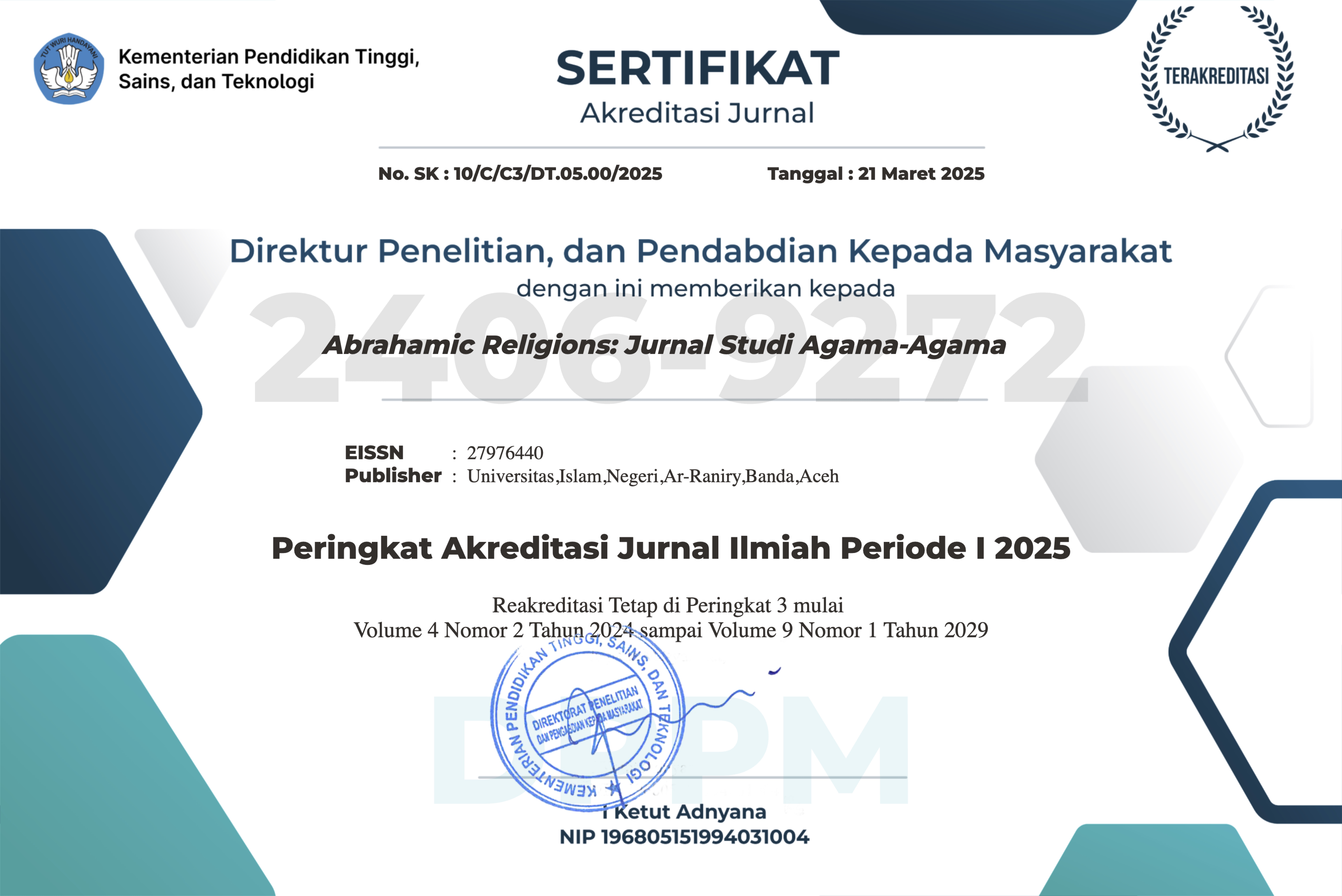Digital Da’wah Strategies for Moderate Islamic Communication: A Content Analysis of Muhammadiyah East Java’s Online Platforms
DOI:
https://doi.org/10.22373/arj.v5i2.30818Keywords:
Digital da'wah, moderate Islam, Muhammadiyah, religious media, platform differentiation, digital religious communicationAbstract
This study examines how Muhammadiyah East Java advances progressive, moderate Islamic communication through three official portals, PWMU.co, Klikmu.co, and Majelistabligh.id. We conducted a qualitative content analysis of twelve purposively selected articles published between January 2022 and July 2024, complemented by three semi-structured interviews with editorial staff. The Mediatization of Religion framework provided a lens to trace adaptations to digital media logics, while Uses and Gratifications served as an interpretive lens rather than a formal coding dimension. A codebook defined three categories: (1) Moderation and Wasathiyah, (2) Progressive Islam and Muhammadiyah ideology, and (3) Religion–Science integration. Articles were coded by a primary researcher, with a limited secondary check on a subset; no formal inter-rater reliability was conducted. Findings indicate a preliminary pattern in the use of moderation and progressive frames across platforms, with PWMU.co emphasizing analytical organizational discourse, Klikmu.co prioritizing concise, shareable pieces, and Majelistabligh.id focusing on moderation and deradicalization materials. Religion–Science integration appeared less frequently. Editorial testimonies suggest perceived audience interest in moderation-oriented content, although these indicators were self-reported rather than analytics-based. The study offers preliminary evidence of coordinated platform differentiation that maintains ideological coherence within a regional Islamic organization. Limitations include small sample size, confirmatory sampling, and restricted reliability testing, which constrain generalizability and underscore the need for larger comparative studies that incorporate audience analytics.
References
Abdullah, M. Q., & Mubarak, D. F. (2020). Strategi Dakwah dalam Merawat Pluralitas di Kalangan Remaja. Anida (Aktualisasi Nuansa Ilmu Dakwah), 19(2), 177–198. https://doi.org/10.15575/anida.v19i2.7589
Ahmad, F. Z., Emeraldien, F. Z., Permatasari, R. D., & Zahda, V. H. (2022). Bringing Religious Moderation Insights to “TikTok Da’wah.” Jurnal Komunikasi Islam, 12(1), 1–18. https://doi.org/10.15642/jki.2022.12.1.1-18
Arifin, S., Mughni, S. A., & Nurhakim, M. (2022). The Idea of Progress: Meaning and Implications of Islam Berkemajuan in Muhammadiyah. Al-Jami’ah, 60(2), 547–584. https://doi.org/10.14421/AJIS.2022.602.547-584
Cinelli, M., de Francisci Morales, G., Galeazzi, A., Quattrociocchi, W., & Starnini, M. (2021). The echo chamber effect on social media. Proceedings of the National Academy of Sciences of the United States of America, 118(9). https://doi.org/10.1073/pnas.2023301118
Derysmono, D. (2021). Optimalisasi Manajemen Dakwah Digital Perspektif Maqashid Al-Qur’an. Jurnal Manajemen Dakwah, 9(1), 100–114. https://doi.org/10.15408/jmd.v1i1.24036
Huda, S., Maulana Mas’udi, M., & Muthohirin, N. (2022). The Rise of Muhammadiyah’s Islamic Da’wah in the Contemporary Era: Transformation to Online Trend and Responses to Islamic Moderation. Progresiva : Jurnal Pemikiran Dan Pendidikan Islam, 11(01), 1–24. https://doi.org/10.22219/progresiva.v11i01.20889
Indra Maulana, & Milana Abdillah Subarkah. (2024). Implementasi Komunikasi Dakwah Muhammadiyah dalam Meningkatkan Kesadaran Agama. Jurnal Kajian Dan Penelitian Umum, 2(4), 68–74. https://doi.org/10.47861/jkpu-nalanda.v2i4.1172
Khoirudin, A., Baidhawy, Z., & Nor, M. R. M. (2020). Exploring muhammadiyah’s historical civilizational dimension of social reconstruction in Indonesia: Humanitarian and cosmopolitan approaches. Journal of Al-Tamaddun, 15(1), 183–197. https://doi.org/10.22452/JAT.vol15no1.13
Kusnawan, A., & Rustandi, R. (2021). Menemukan Moderasi Beragama dalam Kaderisasi Dakwah: Kajian pada Pemuda Persatuan Islam Jawa Barat. NALAR: Jurnal Peradaban Dan Pemikiran Islam, 5(1), 41–61. https://doi.org/10.23971/njppi.v5i1.2900
Kuswana, D. (2024). Digital Counter-Radicalism: The Strategic Role of Religious Organisations in Shaping Moderate Islam in Indonesia’s Cyber Realm. Khazanah Theologia, 6(1), 45–60. https://doi.org/10.15575/kt.v6i1.33369
Lövheim, M., & Hjarvard, S. (2019). The Mediatized Conditions of Contemporary Religion: Critical Status and Future Directions. Journal of Religion, Media and Digital Culture, 8(2), 206–225. https://doi.org/10.1163/21659214-00802002
Maulana, R. E., & Sumarlan, I. (2023). Digital Da’wah communication of the Muhammadiyah central leadership Tablighi Council using YouTube account. Symposium of Literature, Culture, and Communication (SYLECTION) 2022, 3(1), 707. https://doi.org/10.12928/sylection.v3i1.14072
Muh Farhan Ali, & Muh. Nur Rochim Maksum. (2024). Tantangan Dakwah Muhammadiyah di Era Digital. Tabsyir: Jurnal Dakwah Dan Sosial Humaniora, 5(3), 230–241. https://doi.org/10.59059/tabsyir.v5i3.1513
Noor, I. H., & Dartim, D. (2021). Kepemimpinan Transformasional Dalam Pendidikan Islam Yang Unggul. Iseedu: Journal of Islamic Educational Thoughts and Practices, 5(1), 68–84. https://doi.org/10.23917/iseedu.v5i1.15993
Pajarianto, H. (2023). Identifikasi dan inkulturasi Islam Berkemajuan dalam kurikulum Al-Islam Kemuhammadiyahan di Muhammadiyah Boarding School. Ta’dibuna: Jurnal Pendidikan Islam, 12(1), 19. https://doi.org/10.32832/tadibuna.v12i1.8952
Rahman, M., Romelah, R., & Nurhakim, M. (2024). Muhammadiyah dan Islam Wasathyah: Kajian tentang Agency Moderasi beragama melalui Sekolah Muhammadiyah. Journal on Education, 6(2), 12612–12617. https://doi.org/10.31004/joe.v6i2.5047
Rizkiyah, F. N. (2023). Majelis Taklim Rumah Moderasi Beragama KUA Kecamatan Tongas sebagai Upaya Aktualisasi Moderasi Beragama. Al-Jadwa: Jurnal Studi Islam, 2(2), 170–185. https://doi.org/10.38073/aljadwa.v2i2.961
Sundar, S. S. (2020). Rise of Machine Agency: A Framework for Studying the Psychology of Human-AI Interaction (HAII). Journal of Computer-Mediated Communication, 25(1), 74–88. https://doi.org/10.1093/jcmc/zmz026
Syafi’i, A. R. (2023). RISALAH ISLAM BERKEMAJUAN Perspektif Sosiologi Pengetahuan Karl Mannheim.
Downloads
Published
Issue
Section
License
Copyright (c) 2025 Muhammad Andrey Anto

This work is licensed under a Creative Commons Attribution-ShareAlike 4.0 International License.
Authors who publish in this Journal agree to the following terms:
- Authors retain copyright and grant the journal right of first publication with the work simultaneously licensed under Attribution-ShareAlike 4.0 International (CC BY-SA 4.0) allows others to share the work with an acknowledgment of the work's authorship and initial publication in this journal.
- Authors are able to enter into separate, additional contractual arrangements for the non-exclusive distribution of the journal's published version of the work (e.g., post it to an institutional repository or publish it in a book), with an acknowledgment of its initial publication in this journal.
- Authors are permitted and encouraged to post their work online (e.g., in institutional repositories or on their website) prior to and during the submission process, as it can lead to productive exchanges, as well as earlier and greater citation of published work. (See The Effect of Open Acces)















